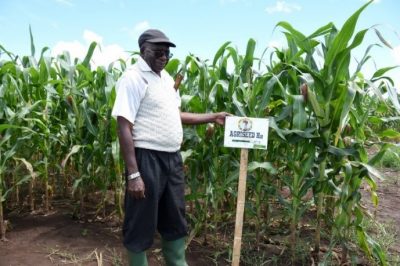
MBEYA, Tanzania (CIMMYT) – To achieve its objective of sustainably increasing the availability of new drought tolerant maize varieties in eastern and southern Africa, the International Maize and Wheat Improvement Center (CIMMYT) supports seed company partners in enhancing their capacity to produce foundation and certified seed.
AgriSeed began as a small seed company in Tanzania in 2010, producing seed using donor grants to get established, and selling seed through a government subsidy program. When the program closed in 2013, collapse of the business was a real threat. However, in 2015 AgriSeed received its first grant from the CIMMYT-led Drought Tolerant Maize for Africa Seed Scaling (DTMASS) project to produce early generation seed of a new hybrid called WE2112, and are now on their way to sustainability.
“When the African Agricultural Technology Foundation announced licensing of this variety, we jumped at the opportunity,” said Ambonesigwe Mbwaga, Director of AgriSeed. “We wanted something we could call our own, since all our other products are public and can be produced by another company.”
WE2112, marketed as AgriSeed H12, is the first hybrid sold by the company, with CIMMYT supporting the transition from open pollinated varieties to improved hybrids. Profitable sales of improved maize varieties are key to sustained and scaled production by the private sector to ensure access in the long run. Being among the few seed companies producing this particular hybrid gives AgriSeed an edge in the market.
“With AgriSeed, we started from scratch: increasing the parents, increasing the inbred lines, single crosses, and so on,” said James Gethi, maize breeder and DTMASS technical lead for Tanzania. “My main excitement this year is to see the product of that support coming to fruition. They now have a certified crop, from zero, and have something to sell.”
According to Mbwaga, the product is “flying off the shelves.” While only three tons of AgriSeed H12 were produced and sold in 2016, AgriSeed expects this figure to rise to over 50 tons in 2017 due to increased production capacity, and the huge demand created from the minimal sales. Also of note is the AgriSeed H12 packaging, whose smallest pack is five kilograms, much larger than the one and two kilogram bags often sold of new products to smallholder farmers. This is a strong indicator of demand and confidence in the product, since it costs more to purchase the bigger bag.
To promote sales, the company has set up over 100 demonstration plots for 2017 with DTMASS support, most of them in the southern Tanzania towns of Mbeya, Mbozi and Mlonge. Unlike the traditional highway setups, AgriSeed is concentrating demos along roads in villages, increasing access to farmers away from major roads. This aims to boost sales but also helps the United States Agency for International Development (USAID), the project’s funder, reach its Feed the Future goals to reach remote smallholder farmers.
Through technical and financial support and capacity building initiatives, DTMASS works closely with AgriSeed and other partners in eastern and southern Africa to bring affordable, improved maize seed to 2.5 million people. With funding from the USAID, DTMASS aims to meet demand and improve access to good-quality maize through production of improved drought-tolerant, stress-resilient, and high yielding maize varieties for smallholder farmers.
 Capacity development
Capacity development 
